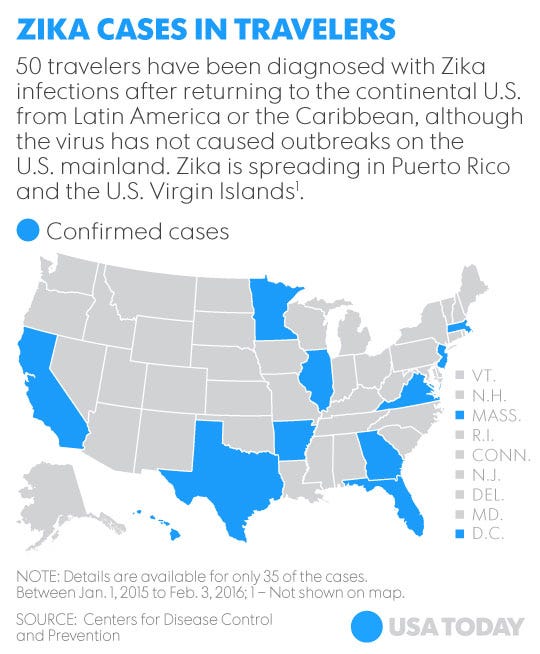Zika confirmed in people in Indiana and Ohio, among other states
Health officials in Indiana, Ohio, Tennessee and Delaware on Tuesday announced the first human cases of Zika in their states, but experts say the risk of contracting the virus locally remains low.

Ohio officials said the virus was reported in a 30-year-old Cleveland woman. Indiana officials wouldn't say where in the state the resident who contracted Zika lives, although they did say the person wasn't pregnant and never got sick enough to require hospitalization. Both people had recently traveled to Haiti, one of 30 countries and territories with active Zika virus transmission, according to the U.S. Centers for Disease Control and Prevention.
The Tennessee resident had recently traveled to South America before returning to east Tennessee, state health officials there say. Delaware's case was also travel-related.
Although Zika is a mild illness in most people, doctors connect it to a surge in neurological disorders and the birth defect microcephaly, in which infants are born with abnormally small heads and incomplete brain development. It is usually spread by mosquitoes, but can also spread through unprotected sex, blood transfusions or rarely from mother to child around the time of birth. There's no vaccine or treatment.
"The risk of contracting Zika virus here in Indiana remains low, but we know that many residents are concerned,” said physician Jerome Adams, Indiana's state health commissioner. “We urge anyone visiting affected areas to take steps to avoid mosquito bites.”
Overall, Zika has been identified in at least 13 states and Washington, D.C. Federal officials said 50 U.S. cases are associated with travel to affected areas, and one, in Texas, was sexually transmitted. No cases have been spread by mosquitoes in this country, and it's too cold for mosquitoes to be out and biting in most of the United States right now.
Obama asks for $1.8 billion in emergency Zika funding
Currently, health officials said there is an epidemic of Zika in Mexico, the Caribbean and Central and South America, and the CDC has advised pregnant women to avoid traveling to affected areas because of concerns about birth defects. Officials also recommend that men with a pregnant partner who live in or have recently traveled to an affected area abstain from sex or consistently use condoms for the entire pregnancy. The CDC also recommends that pregnant women without symptoms of Zika be tested two to 12 weeks after returning from areas with Zika outbreaks.
About 80% of people with Zika don't have signs of the disease. But when they do, symptoms include fever, rash, joint and muscle pain, red eyes and headache and can last from several days to a week.
Although more cases of Zika are being identified in the United States as time goes on, all but the sexually-transmitted case in Texas have been isolated cases among returning travelers. Brazil, by contrast, had an estimated 1 million Zika infections by the end of last year, and the virus is active locally there. Experts say the virus spreads best in tropical areas because the warmth helps it reproduce.
"There is a risk of transmission of Zika in the U.S., but all the evidence we have so far is it would be limited to the places where dengue (virus) has hit," such as Florida and Hawaii and other places with tropical climates, says Jared Aldstadt, a medical geography at the University at Buffalo.
Officials in several states recommend that residents choosing to travel to Zika-affected areas use precautions against mosquito bites, such as wearing long-sleeved shirts and long pants, using approved insect repellents and staying in places with air conditioning or that use window and door screens.
"Pregnant women should not travel to areas where Zika virus transmission is occurring. Everyone else must weigh the risk against the benefits of travel and make the choice that feels right for them," said Jennifer Brown, public health veterinarian for the Indiana State Department of Health. "People who choose to travel can reduce their risk of Zika virus infection by taking rigorous precautions to prevent mosquito bites."
